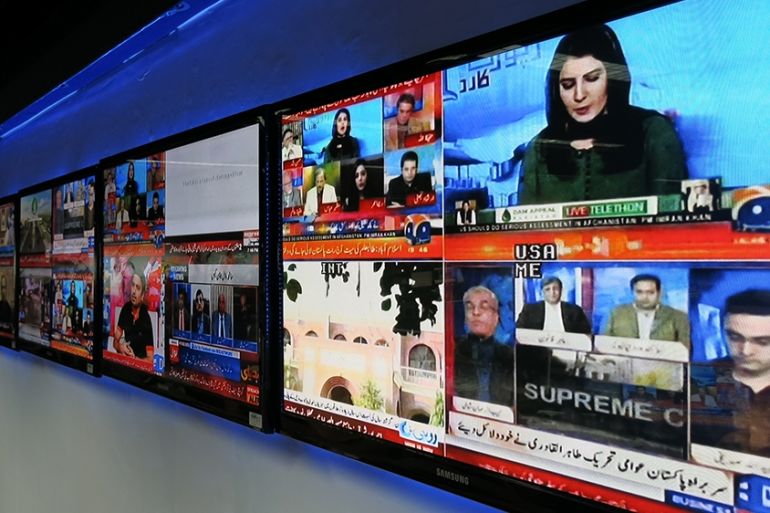Pakistani authorities arrest media mogul on corruption charges
Geo TV says the arrest of its chief was in retaliation to investigative pieces against the gov’t anti-corruption body.

Authorities in Pakistan arrested a media mogul on corruption charges on Thursday, in a decades-old case his representatives said was motivated by a desire to retaliate following the broadcast of several investigative programmes.
The National Accountability Bureau (NAB) arrested Mir Shakeel-ur-Rehman – the editor-in-chief of the Jang Group that includes some of Pakistan’s biggest newspapers and the Geo television network – over a land transaction dating back to 1986, accusing him of scoring illegal concessions in the purchase of plots in the eastern city of Lahore.
Keep reading
list of 3 itemsMedia watchdogs slam ‘brazen censorship’ by Pakistan
Pakistan’s New Look: Foreign vloggers rebranding the country
In a statement, Geo denied the allegations against Rehman, saying all taxes and legal requirements pertaining to the property purchase had been fulfilled.
Geo said the NAB only arrested Rehman because of investigative pieces his channels had conducted into the bureau.
Over the past 18 months the NAB has “sent our reporters, producers and editors – directly and indirectly – over a dozen threatening notices,” the statement read, adding that the bureau had said it would shut down “our channels … due to our reporting and our programmes about NAB”.
“NAB also has through several means tried to persuade us to go slow, to stop stories and to do others in its favour at the expense of the full truth.
Prime Minister, Imran Khan cant tolerate voice of dissent. He has recently expressed his displeasure aganist Jang/Geo and daily Dawn. Arrest of Mir Shakeel ur Rehman is the first step. Dawn can be the next.
— Mazhar Abbas (@MazharAbbasGEO) March 12, 2020
“In its defence, NAB has in writing said it is a constitutionally protected institution that can’t be criticised,” the statement continued.
NAB has rejected the allegations by the Jang Group as “concocted, fabricated and baseless”, Dawn news website reported.
CPJ calls for release of Rehman
The Committee to Protect Journalists on Friday called for the immediate release of Rehman.
“Pakistan’s National Accountability Bureau should immediately release Mir Shakil-ur-Rehman and drop the obviously drummed-up case against him,” said Steven Butler, CPJ’s Asia program coordinator in a statement.
“This arrest over a 34-year-old land deal makes a mockery of Pakistan’s claim to be a democracy that upholds freedom of the press.”
Pakistani media have been subjected to growing censorship and pressure following the election of Prime Minister Imran Khan in 2018.
The NAB was founded in 2000 by then-military ruler Pervez Musharraf to go after corrupt politicians, bureaucrats and entrepreneurs.
Read this show cause notice issued by Pakistan Electronic Media Regulatory Authority it is about @shazbkhanzdaGEO show about NAB Mir Shakeel ur Rehman was under pressure to stop raising questions about NAB when he refused he was illegally detained by NAB on March 12th 2020 pic.twitter.com/C1zMzA7DZb
— Hamid Mir (@HamidMirPAK) March 12, 2020
However, it came under fire after Khan was elected, with leading opposition parties accusing it of being used for political ends.
In recent years the space for dissent has shrunk further in Pakistan, with the government announcing a crackdown on social networks.
Mainstream media houses have decried pressure from authorities that they say has resulted in widespread self-censorship.
Last year, a global watchdog criticised the government for “brazen censorship” of the media after three news channels were taken off air for covering an opposition news conference.
“This is an absolutely unacceptable violation of the principles of media pluralism and independence during a revelation that was clearly in the Pakistani public interest,” said Daniel Bastard, head of Reporters Without Borders’ Asia-Pacific desk in a statement last July.
“We call on Prime Minister Imran Khan’s civilian government to take immediate steps to ensure that cable transmission of the three TV channels is restored. The recent surge in sudden acts of media censorship is exposing the current regime’s increasingly dictatorial nature.”